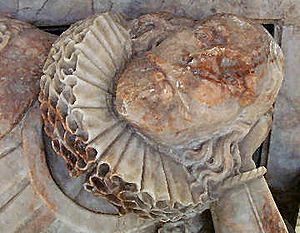Sir Thomas Adams, 1st Baronet facts for kids
Quick facts for kids
Sir
Thomas Adams, Bt
|
|
|---|---|

Effigy from the tomb of Sir Thomas Adams
|
|
| Member of Parliament for the City of London |
|
| In office 1654–1658 |
|
| Lord Mayor of the City of London | |
| In office October 1645 – October 1646 |
|
| Preceded by | Thomas Atkins |
| Succeeded by | John Gayer |
| Personal details | |
| Born | 1586 Wem, Shropshire, England |
| Died | 24 February 1667/1668 |
| Resting place | Sprowston, Norfolk, England |
| Children | Richard Adams |
| Education | Shrewsbury School |
| Alma mater | Cambridge University |
| Occupation | Draper, alderman |
Sir Thomas Adams, 1st Baronet (born 1586 – died 1668) was an important figure in London during the 1600s. He served as the Lord Mayor of the City of London and was also a Member of Parliament (MP) for the City of London from 1654 to 1658.
Thomas Adams was born in 1586 in Wem, a town in Shropshire, England. He went to Shrewsbury School and later studied at Sidney Sussex College, part of Cambridge University, starting in 1600. After finishing his studies, he became a draper in London, which meant he sold cloth and fabrics.
Contents
Becoming a Leader in London
In 1640, Thomas Adams was chosen as a sheriff for the City of London. This was a big step, and he decided to focus on public service instead of his business. He became a leader in the Drapers' Company, a group for people in the cloth trade.
He also served as an alderman on the City of London Corporation, which is like being a city council member. Adams was also the president of St Thomas' Hospital. He helped save the hospital by finding out that a manager was being dishonest. In 1642, he became a Colonel in the Blue Regiment, London Trained Bands, a local military group.
Serving as Lord Mayor
In 1645, Thomas Adams was elected as the 309th Lord Mayor of the City of London. He was known for being very fair and honest. He even turned down extra money that mayors usually made from selling certain positions.
Loyalty During Difficult Times
Sir Thomas Adams was very loyal to King Charles I. Because of this, when the English Civil War began, his home was searched by supporters of Parliament. They hoped to find the King hiding there.
Later, he was even held in the Tower of London for some time. Despite these challenges, he became the oldest alderman in the city, earning the respected title of "father of the city." He also served as a MP for London from 1654 to 1655 and again from 1656 to 1658.
Helping the King Return
Adams showed his strong support for the King even when Charles II was living in exile. He secretly sent the King a large sum of money, about £10,000.
When the King was ready to return to England in 1660, Sir Thomas, who was 74 years old, was chosen to go with General Monck to Breda in the Netherlands. Their mission was to bring the King back home. For his loyalty and service, the King knighted him at The Hague. Soon after the King's return, on June 13, 1661, Sir Thomas was given the special title of a baronet.
Later Life and Legacy
In his later years, Sir Thomas Adams suffered from kidney stones. He passed away on February 24, 1668. He was buried in a special vault under the altar of St Mary and St Margaret Church in Sprowston, Norfolk. A large marble monument was built there to remember him.
Sir Thomas Adams was known for being very generous and helping others. He gave his house in Wem to be used as a free school, which is now known as Thomas Adams School. He also provided money to support it.
In 1643, he helped create a special professorship for the Arabic language at Cambridge University. He also paid for the printing of the Gospels in Persian and had them sent to the East. Even though he lost a lot of his own money, he left gifts in his will to help the poor in many areas, as well as hospitals and widows of ministers.
His eldest son, William, inherited his title and estate. His second son, Richard, became known for his poetry.
 | May Edward Chinn |
 | Rebecca Cole |
 | Alexa Canady |
 | Dorothy Lavinia Brown |

